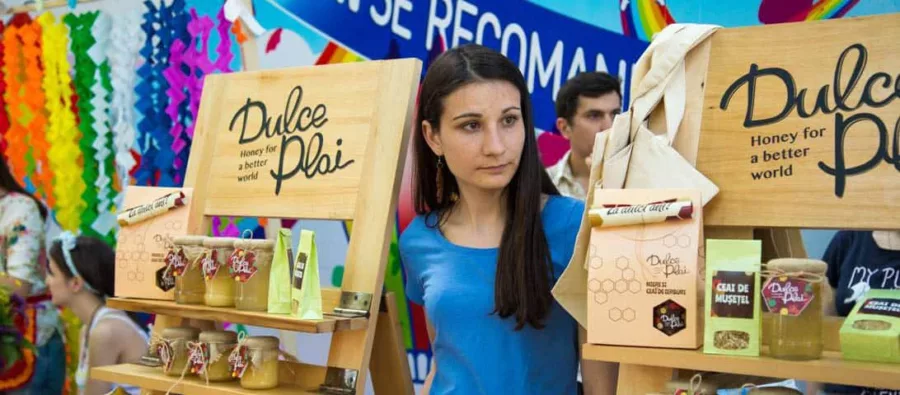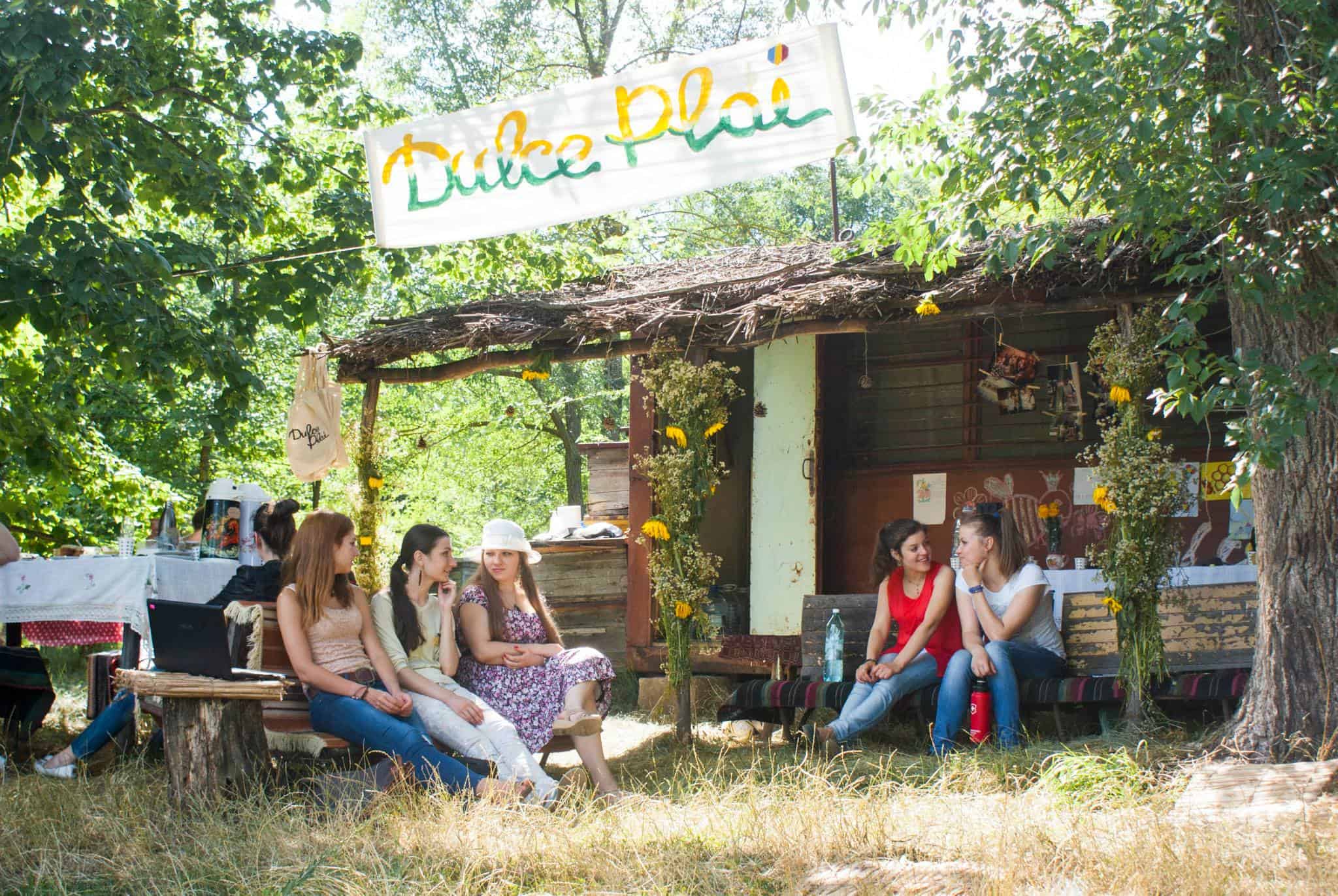Sweet opportunities for Moldovan honey

Political reforms in Moldova following last year’s elections are creating fertile ground for social enterprises and small businesses, such as beekeeping, to flourish.
After a landslide victory for the reformist Party of Action and Solidarity in elections in July 2021, Moldova is looking for a closer relationship with the European Union. Its desire to adopt European economic standards brings opportunities for growth in the nascent social economy, especially for small-scale farmers and food producers. Enterprises that aim to turn a profit while fulfilling a social or environmental purpose are beginning to take root.
Liza Mamaliga, a John Smith Trust Fellow since 2017, is the executive director of Dulce Plai, a social enterprise in the beekeeping and honey industry. Beekeeping is a craft that runs in Liza’s family. “My father had bees,” she says. “It was one of our main sources of income. But my parents were not paid the right value for all the work they were doing.
“I was sad that my parents and other beekeepers had to work so hard to get so little. But then I saw examples from abroad of how we can bring more value and make it better for beekeepers.”
Passionate about honey

As well as producing her own high-quality honey following sustainable and ethical business practices, Liza is passionate about supporting other small-scale honey producers.
“Most of our work is to pioneer products, ideas, ways of selling, communication about the importance of beekeeping,” she says. “In Moldova we have really fertile soil and great potential for producing food and agricultural products. Since last year there has been a lot of support from the government to start businesses in this field and young people are involved in this.
“We have a more open government at the moment, so it is the best time to bring these ideas and make it happen.”
Different approaches
During her John Smith Trust fellowship in 2017, Liza was keen to see how social enterprises work in the UK. “I was mostly looking for ideas,” she says. “I visited four social enterprises which I learned from. The first thing was how diverse they were. I learned we can have different approaches to one problem.”
Liza visited the Eden Project in Cornwall and said that it gave her a “whole new perspective” on the potential of a social enterprise to generate an income. “I was inspired that it’s possible to grow big and have a bigger impact,” she says.
She also spent a day with Matthew Thomson, former chief executive at Fifteen, Jamie Oliver’s social enterprise restaurant, which trained disadvantaged young people to be chefs. Over 14 years, the restaurant recruited more than 200 trainees, 130 of whom completed the training and found jobs. Liza said: “Matthew was so inspirational, and I learned from everything he said, in particular, how partnerships are so important.”
Creating new products
To diversify and expand the business, Dulce Plai has been investing in new products. “In 2018, we started producing energy bars with honey,” says Liza. “The bar has nuts in it, so if we grow the sales, we can help not just beekeepers but also many local producers of hazelnuts and almonds.”
Liza decided to develop the energy bar in neighbouring Romania, where Dulce Plai has a small production site. “We sell in cities there, in cafes and little shops and online,” says Liza. “Looking back, it was a good decision. We’ve learned so much and built a connection to the market and access to opportunities that we can bring to Moldova.”
Alongside growing her own business, Liza has been involved in advocating for legislative changes to support rural economic development. “For some years I was involved in a non-profit called Ecovisio,” she says. “We were pioneering the idea of social entrepreneurship and providing training for citizens interested in creating social businesses.
“We were also key players in lobbying the government to support social enterprise in Moldova. Now you can register as a social enterprise. And from next year there is a plan to get more support from government for starting social enterprises and developing existing ones.”
Online platform for local producers
Liza is also building an online platform for food producers to sell their products within Moldova, which she will launch in September 2022. She says: “We want to sell products from local producers – not just honey but anything you want to eat from local small producers – with fast delivery and paying with a card.
As well as supporting local producers, Liza wants to promote healthy eating and persuade public institutions to offer better quality food. “We want to lobby the government and local institutions to buy the local products for schools, for hospitals because it’s insane what bad quality they give to kids and people in hospital.”
This makes good economic sense as well, Liza argues. When local producers make a bigger profit they can pay more tax, so the money can be reinvested in public services.
Social enterprise competition
Liza continues: “Our project has an educational component and a charitable component. We will create a school programme about healthy and local food, a campaign to raise awareness about the super-processed food, additives, labour conditions etc. And we will donate food to people that cannot provide for themselves or are left alone, including old people, kids without parents and simply a person that at a certain moment do not have food on their table and need support.
Liza entered the Accelerator of Social Enterprises competition and was successful in her bid, receiving EUR7,500 to support the launch of her project. The project is called Trei de Bine which translates as something like ‘three times good’ – the idea is that it does good for producers and the local economy, it’s good for consumers and food beneficiaries and it’s good for the environment.
“My contact with people involved in the Jamie Oliver Campaign for healthy food in schools was a big asset when I was interviewed by the judges for our social business plan to create the shop and the healthy eating campaign,” says Liza.
Moldovan honey in the EU
With a population of around 2 million, Moldova’s internal market is small, with limited potential for growth. Liza’s efforts to promote honey have been so successful that Dulce Plai and other beekeepers are now producing more honey than they can sell in local shops. A trade agreement between EU and Moldova means there are possibilities for export to a much bigger market. The challenge is to get a fair price.
Liza says: “When we understand how all the logistics work, we’ll have everything ready to get into the external market. So first we prepare and practice in the local market with the best local products and then with demand we can export them.
“We want our honey to be the ambassador of Moldova in Europe but with the aim to support local honey producers so that they have fair price for their work.”
John Smith Trust network
Liza says: “I believe we can support each others’ projects when we have something in common. We can learn from each others’ experience. Our projects become more visible with the articles in the newsletter. And about having a mentor, yes, that is something I am ready for. We have more projects going on both business and social and my next step in professional development is to create teams that will accelerate the implementations and will enrich a lot the projects. And here is where a mentor will have an important role.
Liza adds: “Simply put, we want to leave the world a bit better than we have found it and a sweeter future for the next generation of people and bees.”
Find out more about our fellowship programmes.
